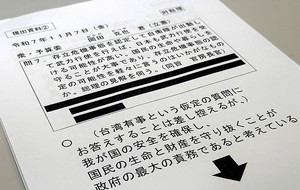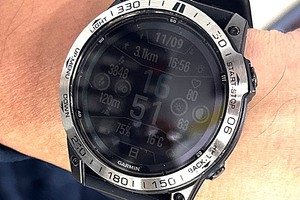By KEISUKE YAMAZAKI Staff Writer
June 7, 2021 at 07:10 JST
 Dai Tamesue, center, finishes third in men’s 400-meter hurdles during the World Athletics Championships in 2001. (Asahi Shimbun file photo)
Dai Tamesue, center, finishes third in men’s 400-meter hurdles during the World Athletics Championships in 2001. (Asahi Shimbun file photo)
A seemingly simple inquiry at a meeting has led to a wave of sports organizations withholding the heights and weights of athletes from public viewing.
Some officials fear that such details could be used to torment the athletes on social media or by their competitors to gain an advantage.
Others said these body features are private information or are irrelevant to the sports being played.
The Japan Association of Athletics Federations in February decided to refrain from collecting athletes’ heights and weights and publishing them in brochures and other media.
The move came after “a comment was raised quite by chance” during a mid-January meeting of a women’s marathon steering body, a JAAF official said.
Near the end of the meeting, one attendee referred to a document that described the profiles of athletes, including heights and weights, and asked how that data was supposed to be handled, the official explained.
“We felt embarrassed and reflected on how we had obtained the approval of the athletes,” said Akio Ishii, head of the JAAF management and planning department. “We were too lax in our awareness of the issue of personal information.”
After the secretariat and advisory committees discussed the matter, the JAAF moved to withhold height and weight figures, partly because track and field competitions are not held by weight class.
The federation, however, decided to continue disclosing birth dates, the names of schools attended, and personal bests. Birth dates are required for handling records by age, such as in “under 18” competitions, and the names of the schools are needed when referring to past records.
The JAAF asked member organizations, including prefectural athletics associations, and partner organizations, such as the All Japan High School Athletic Federation, to refrain from collecting and publishing athletes’ height and weight information.
The national federation also deleted the items from application forms for athletic meets.
At the request of gymnasts and their representatives, the Japan Gymnastics Association has also stopped publishing their weights in its official competition programs and other documents.
The Japan Swimming Federation in April released a list of Japan’s national team members for the Tokyo Olympics but withheld their weights.
However, the Nippon Badminton Association continues to use the heights and weights of Japan’s national team members in their profiles on its website.
The Japanese Olympic Committee decided in spring to exclude height and weight data from the directory of Japan’s national team members for the Tokyo Olympics.
During a meeting of the JOC Sports Committee, an attendee raised concerns that similar data could be used in a discriminatory manner against athletes, an official said. Another attendee argued that similar information should be withheld to protect medal strategies.
Yumiko Honma, a lawyer who deals with sport issues, said more data is being withheld partly because the spread of social media has diffused such information.
“Athletes’ awareness of their own rights is rising,” she said. “There will be a continued trend for more withdrawals of data.”
The JAAF cited “online slander and spread of misinformation” as reasons for its decision.
The federation said it is particularly concerned about abuse of the heights and weights of female athletes. Those numbers, as well as data calculated from them, such as body mass index, an indicator of obesity, have taken on lives of their own online, the JAAF said.
“Some athletes said they had had unpleasant moments,” Ishii said. “We took the measure to prevent others from suffering in a similar manner.”
Some, however, are skeptical of the trend.
“World Athletics has labeled me as one of the smallest medalists in stature,” said Dai Tamesue, a former track star who holds the Japanese record in men’s 400-meter hurdles.
“One Swiss teenager who wanted to compete in athletic sports learned about that and sent me a letter saying that I was an inspiration for him,” Tamesue said. “It will become possible in the future to calculate heights and weights from videos, so I don’t believe it makes a lot of sense to withdraw similar information in official terms.”




















A peek through the music industry’s curtain at the producers who harnessed social media to help their idols go global.
A series based on diplomatic documents declassified by Japan’s Foreign Ministry
Here is a collection of first-hand accounts by “hibakusha” atomic bomb survivors.
Cooking experts, chefs and others involved in the field of food introduce their special recipes intertwined with their paths in life.
A series about Japanese-Americans and their memories of World War II